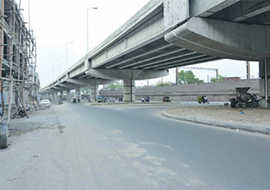40 Grade
Our grade 40 deformed bars range ...
Company Overview
Our group has succored the construction industry within the country for more than a century. driver by patriotism and allegiance to strength infrastructure of a new nation. Haji Muhammad Din who migrated to Pakistan after participation, laid the foundation of the group as Batala Steel in 1960.
Best Quality
Universal testing machine (UTM) is used to measure the strength of reinforcement bars.
This test ensures that bend radii are not created below the given minimum sizes according to relative standards. The performance of steel reinforcement can be badly affected due to incorrect bending.
There are few questions like up to which level material can take the stress? When does it start to deform plastically? The answers to these types of questions can be solved during Yield stress test. The material will deform elastically until it reaches the yield point and goes back to its original form when stress is removed.
In chemical analysis, chemical composition testing is done in a spectrometer. It takes around 10 to 15 seconds and then gives results in printed form of 26 elements. It shows the result of percentages of carbon, phosphorous and sulphur. Percentages of copper, manganese and chromium given by the spectrometer.
Hi-Tech Machinery
Markhor Steel operates a technologically advanced steel manufacturing plant that is specifically intended for optimum productivity. Integration is ensured at all levels so that a streamlined flow of raw materials, storage and dispatch of finished products is maintained. This integration between business units and a fully automated plant guarantees utmost service and quality, along with an efficient logistics network, to our valued customers throughout Pakistan.
We Follow
In the initial phase, volumes of high-grade recycled steel scrap are collected and sorted. The materials are then processed via Induction Furnace method to adjust the composition of the steel.
This steel is finally cast into billets using Continuous Casting Process. In this process molten steel is poured into molds which then turn the metal into long, rectangular forms called steel billets. These bullets are then turned into bars.
The heated billets pass through three stands; Roughing, Intermediate and Finishing Stands, where the rolling mill reduces the thickness and extends the overall length. Water quenching system cools and hardens rebars and this rapid cooling makes the surface hard, it leaves the inner core hot and malleable. After the bars pass through the quenching system, the bars are transferred to special cooling beds to cool down on their own. This makes the hot core cool down to room temperature slowly. Later, the rebars are tested, weighed and bundled for quality assurance and then shipped onward to their final destination.
Our Works

Latest Projects

Latest Projects

Latest Projects

Latest Projects